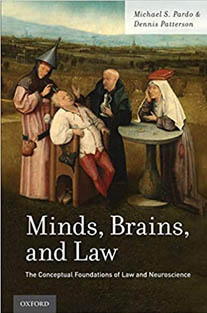Minds, Brains, and Law: The Co...
₨ 4,550.00
Cognitive neuroscientists have deepened our understanding of the complex relationship between mind and brain and complicated the relationship between mental attributes and law. New arguments and conclusions based on functional magnetic resonance imaging (fMRI), electroencephalography (EEG),
and other increasingly sophisticated technologies are being applied to debates and processes in the legal field, from lie detection to legal doctrine surrounding criminal law, including the insanity defense to legal theory.
In Minds, Brains, and Law, Michael S. Pardo and Dennis Patterson analyze questions that lie at the core of implementing neuroscientific research and technology within the legal system. They examine the arguments favoring increased use of neuroscience in law, the scientific evidence available for the
reliability of neuroscientific evidence in legal proceedings, and the integration of neuroscientific research into substantive legal doctrines.
The authors also explore the basic philosophical questions that lie at the intersection of law, mind, and neuroscience. In doing so, they argue that mistaken inferences and conceptual errors arise from mismatched concepts, such as the disconnect between lying and what constitutes “lying” in many
neuroscientific studies. The empirical, practical, ethical, and conceptual issues that Pardo and Patterson seek to redress will deeply influence how we negotiate and implement the fruits of neuroscience in law and policy in the future.
This paperback edition contain a new Preface covering developments in this subject since the hardcover edition published in 2013
Description
Cognitive neuroscientists have deepened our understanding of the complex relationship between mind and brain and complicated the relationship between mental attributes and law. New arguments and conclusions based on functional magnetic resonance imaging (fMRI), electroencephalography (EEG),
and other increasingly sophisticated technologies are being applied to debates and processes in the legal field, from lie detection to legal doctrine surrounding criminal law, including the insanity defense to legal theory.
In Minds, Brains, and Law, Michael S. Pardo and Dennis Patterson analyze questions that lie at the core of implementing neuroscientific research and technology within the legal system. They examine the arguments favoring increased use of neuroscience in law, the scientific evidence available for the
reliability of neuroscientific evidence in legal proceedings, and the integration of neuroscientific research into substantive legal doctrines.
The authors also explore the basic philosophical questions that lie at the intersection of law, mind, and neuroscience. In doing so, they argue that mistaken inferences and conceptual errors arise from mismatched concepts, such as the disconnect between lying and what constitutes “lying” in many
neuroscientific studies. The empirical, practical, ethical, and conceptual issues that Pardo and Patterson seek to redress will deeply influence how we negotiate and implement the fruits of neuroscience in law and policy in the future.
This paperback edition contain a new Preface covering developments in this subject since the hardcover edition published in 2013
Additional information
| Authors | Michael S Pardo & Dennis Patterson |
|---|---|
| Cover-Types | Paperback |
| ISBN/ISSN | 9780190253103 |
| Language | English |
| Pages | 276 |
| Publishers | Oxford University Press |
| Year of Publication | 2015 A.D |






